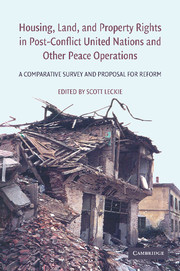 Housing, Land, and Property Rights in Post-Conflict United Nations and Other Peace Operations
Housing, Land, and Property Rights in Post-Conflict United Nations and Other Peace Operations 1 - United Nations Peace Operations and Housing, Land, and Property Rights in Post-Conflict Settings: From Neglect to Tentative Embrace
Published online by Cambridge University Press: 15 July 2009
Summary
The rather imperfect track record of United Nations peace operations in post-conflict peacekeeping and peacebuilding initiatives, combined with the emergence in recent years of several new institutional arrangements within the UN, such as the new Peacebuilding Commission, have led various observers to suggest the need for improved policies on how to best address the many complex challenges that confront the UN and other institutions in keeping and building a sustained peace in countries emerging from conflict. Some have called for the development of policies to address the restoration of the rule of law, the judiciary and transitional codes of criminal procedure, while others have sought to improve UN peace operation performance by addressing the unintended consequences of these operations.
This book, by contrast, explores a series of challenges found within all conflict and post-conflict settings, but which have only recently begun to receive the structural attention they deserve. Namely, this volume examines how and the extent to which various UN and selected other peace operations have (or have not) incorporated housing, land, and property (HLP) rights competencies within the design of the operations concerned, and in the implementation of the relevant peace agreements involved. In so doing, it provides an overview of some eleven (mostly, but not exclusively, UN-led) peace operations carried out from 1990 onward, including operations in Cambodia, Kosovo, East Timor, Solomon Islands, Bougainville, Afghanistan, Burundi, Rwanda, DR Congo, Iraq, and Sudan.
- Type
- Chapter
- Information
- Housing, Land, and Property Rights in Post-Conflict United Nations and Other Peace OperationsA Comparative Survey and Proposal for Reform, pp. 3 - 16Publisher: Cambridge University PressPrint publication year: 2008
- 1
- Cited by


